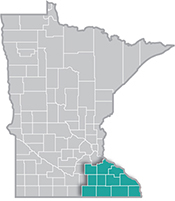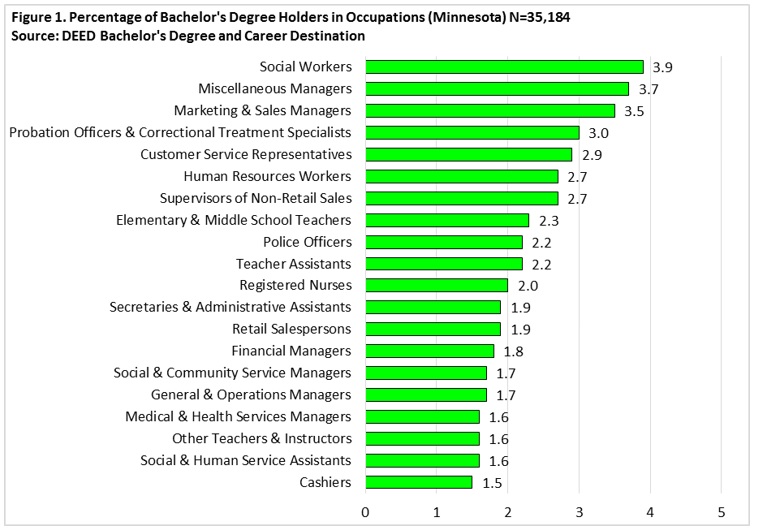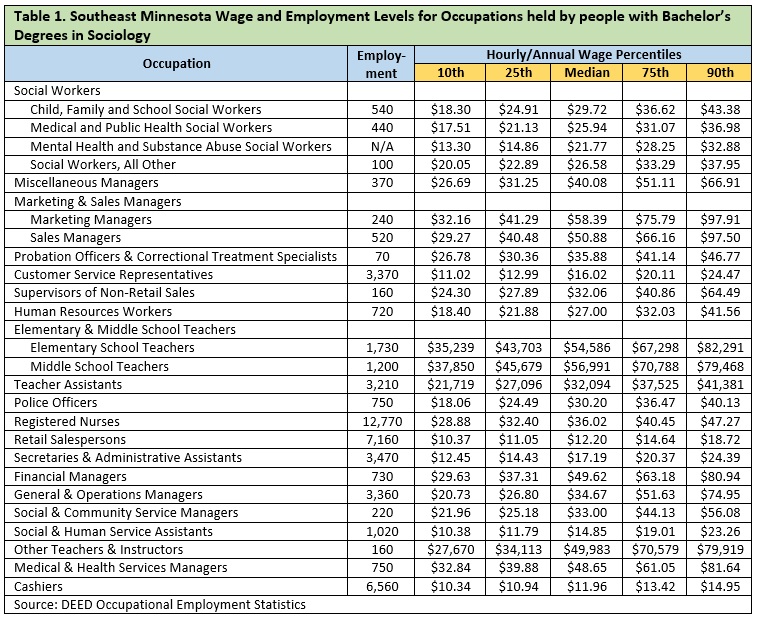 Southeast Minnesota is a health care and agricultural powerhouse. The region is home to the renowned Mayo Clinic and some of the world's most recognized food companies and brands.
Southeast Minnesota is a health care and agricultural powerhouse. The region is home to the renowned Mayo Clinic and some of the world's most recognized food companies and brands.
Advanced manufacturing is especially strong here, with machinery, chemicals, and electronics among the top products.
Want the freshest data delivered by email? Subscribe to our regional newsletters.
6/11/2019 10:00:00 AM
At some point, many sociology majors may be asked: “What are you going to do with a degree in sociology?” That can be a tough question to answer since there are very few jobs as sociologists. In fact, there are only 2,710 sociologists in the U.S., according to DEED’s Occupational Employment Statistics data. No data was available for the number of sociologists for the Southeast region or even the state of Minnesota.
So, what occupations are they working in? DEED has a new Bachelor's Degree and Career Destination data tool that visually displays fields of study at the bachelor’s level and the observed labor market outcomes for Minnesota residents.
As shown in Figure 1, many individuals who hold a bachelor’s degree in sociology are working in management, including marketing and sales managers, financial managers, social and community service managers, general and operations managers, and medical and health services managers. The highest percentage of bachelor’s degree holders work as social workers, while other more common occupations include customer service, human resources, education, health care, corrections, and sales.

While the Bachelor’s Degree and Career Destination data is for the state as a whole, all of these occupations in which sociology graduates work exist in the Southeast region. The regional employment data for Southeast Minnesota shows that the number of people employed in these specific occupations varies significantly. For example, there are only 70 individuals employed as probation officers in the region while 12,770 people are employed as registered nurses. Wages also vary considerably with 10th percentile hourly wages as low as $10.34 for cashiers to a high of $32.84 for medical and health services managers; median wages ranging from $11.96 for cashiers to $58.39 for marketing managers; and 90th percentile wages ranging from $14.95 for cashiers to $97.91 for marketing managers (Table 1).

However, additional education, training, licensure and/or experience may be required for many of these occupations. For example, it is likely that a certain amount of experience is needed before someone becomes employed or promoted into a management position. Additionally, some of the occupations, such as social workers, teachers, and registered nurses, require additional education/credentials, such as a bachelor’s or master’s degree in social work, education, or nursing, not to mention licensure as a social worker and teacher.
Some occupations are likely “starter” jobs, such as customer service representatives, retail salespersons, and cashiers. While these occupations are among the lowest paying, they do provide opportunities to gain experience before moving on to a position that is a better fit for someone with a bachelor’s degree in sociology. After all, sociology is the study of human behavior, and what better way to study human behavior than working with people?
It seems that opportunities are abundant in the Southeast region for those who hold a bachelor’s degree in sociology. Knowing this, the answer to “What are you going to do with a degree in sociology?” may well be “What can’t I do?”
Contact Mark Schultz.